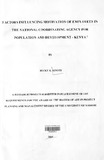| dc.description.abstract | Individual differences and work-context characteristics may lead to differences in employees' motivation, job satisfaction and performance. In an era when public organizations seek to attract and retain highly qualified employees, managers and designers of motivation systems should carefully scrutinize and evaluate the reward preferences of their personnel. Using both quantitative and descriptive statistics on data from a questionnaire-based survey, this study sought to explore factors that influence employee motivation in the National Coordinating Agency for Population and Development.
Data was collected using two questionnaires and an interview schedule. One questionnaire was administered to senior management and the other to middle management and administrative support staff in the Agency. The study had a response rate of 93%. Data was analyzed using statistical tools which included frequencies, cross tabulation and ANOV A. Key findings of the study indicate that all respondents view communication as an important motivating factor. However some respondents in the middle management and support staff cadres reported not to have frequent communication with their supervisors.
Training was reported as a motivating factor. Findings indicate that there is disparity in according training opportunities with middle management reporting satisfaction with training received, and administration support staff reporting dissatisfaction. Salaries and wages were considered important in motivation, and only one fifth of the respondents reported to be satisfied with their current pay. Fringe benefits and work environment are also considered by respondents as important motivating factors. Ranking of motivation factors indicated that job security and opportunity for advancement are ranked first and second respectively, with salary, training and team work ranked third.
These are followed by communication, work environment, personal development, funge benefits, interesting job and flexible working hours respectively. Recommendations of the study inc1ude improved communication, review of the training programmes, salary review in the Agency, and c1ear career progression guidelines. The study gives suggestion for further study in the area of investigating the relationship between reward and motivation towards work performance, and relationship between performance and work related pay in the public service in Kenya. | en_US |

